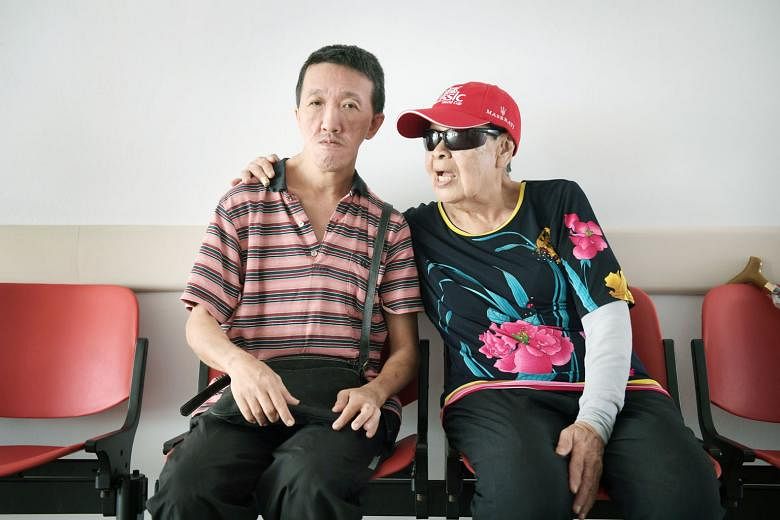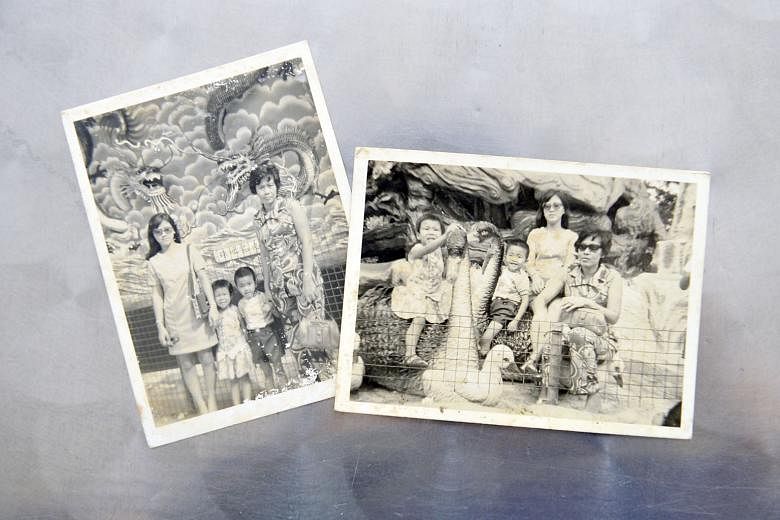Hers is not a rags-to-riches story and though Singapore prospered, she did not.
Madam Ng Ah Chun, 89, has struggled her whole life and now lives on financial aid.
She grew up with a father who had rejected her, and was left alone after her husband died when she was in her 20s. She later helped a neighbour couple look after their child, but then they abandoned the baby, moving out without leaving her an address or phone number.
Madam Ng could have easily given up the baby boy. But she cared for Tan Chye Teck, a special-needs child, as her own, while struggling on with her measly income as a seamstress.
She said in Hokkien: "My other neighbours told me to leave him at a church that took care of abandoned babies but I couldn't bear to do so. He is unwanted. My father also did not want me. It's tragic to be unwanted, so I decided to raise him."
Back in the 1960s, unwanted babies were left on the doorstep of the Convent of the Holy Infant Jesus in Victoria Street for the nuns to care for them in its orphanage.
Madam Ng knew what it felt like to be unwanted. Her father, whom she described as a well-to-do businessman, had scorned her mother after she gave birth to two daughters.
"My father said girls are useless as they belonged to their husbands' families once they wed. He didn't want daughters," Madam Ng, the younger of two girls, said.
Her mother died when she was seven or eight years old.
Madam Ng made up her mind to run away from her home because she did not want to live with her dad and his mistresses.
To survive, she picked wild flowers and sold them as prayer offerings. At night, she slept on a table- tennis table in a school. When she had no money, she looked for scraps in rubbish bins. "There were always kind people who gave me food and clothes," she added.
Madam Ng, who did not attend school and is illiterate, lived on the street until she was about 10 years old, when an elderly couple took pity on her and took her into their home.
They later asked her to marry their grandson, a sailor who was about 10 years her senior. Tragedy struck when he died suddenly from a stroke shortly after they had their wedding ceremony. She did all kinds of jobs, from cleaning to babysitting and sewing, to survive.
In 1966, while she was living in a kampung in Sengkang, a neighbour asked if she could babysit her infant son. After a few months, his parents left. She could not locate them, even after placing a newspaper advertisement looking for them. So she adopted Chye Teck.
When he was about three, her friends started to indicate to her he was "not normal" as he was slow in picking up speech. A doctor told her Chye Teck was intellectually disabled. It was a heartbreaking diagnosis.
"Why is he like that? But what can I do?" she said. "He is very obedient, very quiet and very pitiful."
In the 1950s and 1960s, children with intellectual disability were often seen as a source of shame.
A spokesman for the Movement for the Intellectually Disabled of Singapore (Minds) said: "At that time, family image was very important as there may not be suitors for their other children if they knew the family had a child with intellectual disability. And some families even tried to get rid of these babies."
However, attitudes have changed over the decades.
He said: "Parents now strive to provide the best for their children. Among the public, we see that people have developed a sense of empathy, understanding and are generally more compassionate (towards those with intellectual disability) than people in the past."
Mr Tan, now 50, has moderate intellectual disability. He is able to feed and shower himself, and understands simple instructions.
He attended primary school, but dropped out as he could not catch up in class. He is also dependent on his mother, who worked as a seamstress until her 60s.
Madam Ng, who said she had suitors after her husband died, never remarried.
She said: "I have a son and that is enough. I'm content."
Last year, she was bitten by a stray dog and needed medical attention. There was no one to look after Mr Tan at home when she was at the hospital and he was found eating food scraps at a coffee shop near their three-room flat in Hougang.
As Madam Ng suffers from glaucoma and has problems walking due to her age, she decided to send him to live in a home for the intellectually disabled last year.
His stay at Mindsville, a home run by Minds, is fully subsidised by the Ministry of Social and Family Development and the Tote Board.
Madam Ng is on a public assistance scheme for the destitute. She receives $790 a month in financial aid from the Government.
Mr Tan clearly misses her while living at the Minds home. He visits Madam Ng on weekends and cries when he has to go back to Mindsville.
The bond between the pair is obvious from their interactions. He said: "I love her very much. I want to go home."
- If you know someone who should be featured, please e-mail stnewsdesk@sph.com.sg.



